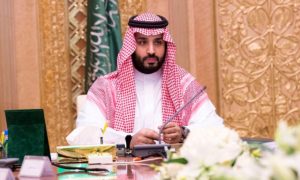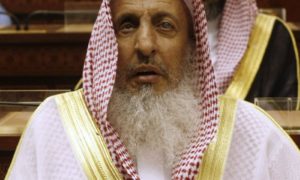A British parliamentary report released on Tuesday has concluded there is “historical evidence” DAESH (IS) group received funding from within Arab Gulf states.
In evidence submitted to the foreign affairs select committee, the Ministry of Defence said: “[There] is historical evidence of financial donations to Daesh [IS] from within Gulf states. Furthermore, it is understood that family donations are being made to Daesh, through the unregulated Alternative Value Transfer Systems (AVTS).”
AVTS include ways of globally transferring money that includes little information about the individuals involved in the transaction – examples include the open source online currency Bitcoin.
The MoD cited as evidence an incident in September 2014 when an DAESH official was sanctioned by the US Treasury Department after receiving a $2m donation “emanating from the Gulf”.
The MoD also said in its evidence that private donations to DAESH are “minimal” compared to its other revenue streams, which include oil and taxation.
The committee said in an assessment of DAESH finances that Britain should be able to “ask hard questions of close friends” when discussing how donations have reached the Syria-Iraq based militant group.
The report concluded that DAESH has been put under severe financial pressure after a sustained international campaign that has forced the group to turn to “gangsterism and protection rackets” for money.
The report argued that plunging oil prices and air strikes on DAESH in Syria and Iraq have reduced the group’s ability to operate, however, the most controversial part is undoubtedly the section on donations to DAESH.
While the government told the committee that it had no evidence any country had provided funding to DAESH as a “matter of policy,” concerns were raised in the report about how Gulf states responded to the group’s initial rise to prominence, before and around the time of its seizing of the Iraqi city Mosul in June 2014.
Middle East Minister Tobias Ellwood told the committee that after DAESH “first caught international attention,” the group “may have been perceived as a defender of Sunni Muslims in the wars in Iraq and Syria”.
Ellwood said that the period of DAESH being viewed as a defender of Sunnis was “before 2014”. Dan Chugg, head of the Foreign Office’s ISIL Task Force, told the committee that “around two years ago” DAESH “may have been able to attract donations from sympathetic Sunnis, with the wealthiest states in the region – the Sunni monarchies of the Gulf – being the subject of particular concern”.
“[It] was certainly a problem in the early days of the Daesh organisation that there was funding coming in from Gulf countries and other places,” Chugg said, using an alternative acronym for IS.
The committee asked Ellwood for his opinion on reports speculating that donations may have been sent to DAESH by individuals close to royal families in the Gulf.
Ellwood said: “It is very opaque, it has to be said. When somebody who is close to the top of a royal family is a very rich individual donor and chooses to do so, that is very likely to happen.”
On the same issue of the royal families being somehow involved – either directly or indirectly – in the funding of DAESH, Chugg told the committee: “It is difficult with some of these countries to know exactly what is government funding and what is not when you are dealing with royal families, wealthy princes and those kind of things.”
“Our strategy was not to try to ascertain whose problem and whose fault it was, but to stop the funding going to Daesh. That was what was important. And that is what our efforts have been focused on.”
Turkey, Gulf deny funding IS
The Gulf states and Turkey have repeatedly denied allegations of funding DAESH and defended their actions by pointing to their role in the international coalition which is attempting to defeat the group.
However, Chugg said that while he is “not aware of hard evidence that those countries were funding Daesh” two years ago, there “was a lot of speculation that those countries were not playing a terribly helpful role” in taking on the group.
The report did say that regional states have since established legal and institutional infrastructure to stop the ability of DAESH to raise funds. But it added that some regional states have been “slow” to implement these measures.
The report cited the fact Saudi Arabia only made it illegal for its citizens to fund DAESH in March 2015, while Britain had designated the group terrorist by June 2014.
Saudi Arabia and other Arab states need to do more to ensure ruling families and powerful figures are not funding Daesh, a UK parliamentary committee has said in a criticism of regional efforts to cut off the terror group’s revenue.
John Baron MP, chair of the committee inquiry team, said that while DAESH’s finances had been damaged, more needed to be done by the UK to help the Iraqi government stop the group from operating within the country’s financial systems.
Meanwhile, the UK government itself has come under fire in recent months for ramping up arms sales to Saudi Arabia, which stands accused of committing war crimes during its military campaign in Yemen. London has shrugged off international calls for an arms embargo on Riyadh.
HUMAN RIGHTS
Saudi Arabia has long been criticised for its harsh social codes and punishments, imposed under its puritanical version of Sharia law.
Beheading:
Ali Mohammed al-Nimr was arrested in February 2012 when he was just 17 and accused of organising protests. He was sentenced to death by beheading and crucifixion, along with his uncle, a leading Shia cleric. Philip Hammond, the Foreign Secretary, said last month he did not expect the sentence to be carried out. However, murderers, drug dealers and others convicted on purely criminal charges are often beheaded in public.
Womens’ rights:
While women did in 2105 get to register to vote and can stand for local elections, they are still required to have permission from a “guardian” such as a father, husband or brother to travel freely. Wearing modest clothes and a headscarf in public is compulsory. They are also banned from driving – subject of the country’s most visible civil disobedience campaign in recent years.
The regime in Saudi Arabia has been strongly criticized by human rights organizations.
Hashtags #SueMeSaudi, #SaudiArabiaIsISIS and #StopSaudiArabia has many hits every minute, and many want to mark their opposition and to show their distance to the brutal dictator regime in Saudi Arabia.
Saudi Arabia practice Wahhabism ideology, a strictly fundamentalist orientation within Sunni Islam, which in practice is the state religion in the country. It is also ideology direction that has inspired al-Qaida and DAESH.







